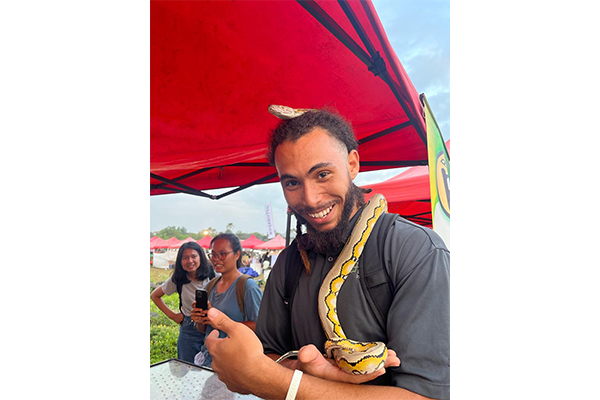Understanding the Big Picture Impacts of Engineering

Student
Across three co-ops, Thando Ray, E’24, mechanical engineering, ensured that the research and projects he worked on had an impact on global environments, including Ghana, Rwanda, Sierra Leone and Indonesia.
Now in his fifth year at Northeastern, Thando Ray, E’24, has realized his primary goal as an engineer. After three co-ops at Burn Design Lab, Build Health International, and su-re.co, he says that his vision is to continue to use his engineering degree to make a visible social impact.
Ray also has a minor in human services, and he recognizes that these studies have directly influenced how he views his potential as an engineer.
“I’m appreciative to everyone who helped me combine different lenses to try to make an impact in the world using all the tools that we have,” he says.
Going into his first co-op at Burn Design Lab, Ray was looking for a hands-on experience that would help him figure out how to apply his skills. It also ended up being an experience that would hit close to home. The Shea Roaster Project, which he spent most of his time working on, was based in Ghana, where he is from. Ray says this made him enthusiastic about working on the project even before his initial interview with Burn Design Lab. Despite working in the Seattle area rather than going overseas for the project, Ray says it gave him a sense of deep personal connection.
For his second co-op at Build Health International, Ray had a radically different experience. He returned to the Boston area, but this time, he had the chance to work overseas in Rwanda and Sierra Leone. Not only did this tie him closer to global non-profits, but it also gave him a more integrated experience.

Ray with BHI, UNICEF and Ministry of Health staff at a hospital in Port Loko.
These two experiences set Ray up for success with his third co-op at su-re.co in Bali, Indonesia. For his first fully international experience, he spent most of his time installing biodigesters. He also used monitoring systems to remotely track them and ensure that they were working properly.
In each co-op, what fulfilled Ray the most was making a visible impact on the lives of those in need. For the Shea Roaster Project at Burn Design Lab, he designed an ergonomic drive system for shea roasting drums. This drive system made the drums easier to turn, relieving joint pain for the women in Ghana who use them.
With Build Health International, he assessed four hospitals in Freetown and Port Loko, Sierra Leone, to ensure access to oxygen plants, adequate electricity and safe infrastructure. These assessments were turned into reports, which he submitted to Ministry of Health officials. Ray also learned to assemble and troubleshoot oxygen booster compression systems, providing a vital resource to those in need.
During his time in Bali, he worked with the su-re.co team to connect with farmers who could make vital use of the biodigesters. For Ray, this was the most significant opportunity for him to combine his mechanical engineering skills with human services experiences.
Working with such a close-knit engineering team also connected Ray with people who motivated him. Bianca Angelique, su-re.co’s engineering officer and Ray’s supervisor, and Lucile Adjahi, a fellow engineering student from France, fostered an encouraging and welcoming environment that helped him make the most of his time in Bali.

Ray installs a biodigester at a farm in western Bali.
“It felt really natural,” Ray says. “Some days, we’d get to work at like 4:00 a.m. and then drive three hours to West Bali… and it’s not really what I pictured doing just in general from younger years, but I loved it so much.”
Ray was also honored with the Huntington 100 award in 2023, but the journey there was more valuable for him than the destination.
“All the human services classes and professors have had an impact on my engineering vision, as well as the engineering teachers who also saw the bigger picture,” Ray says.